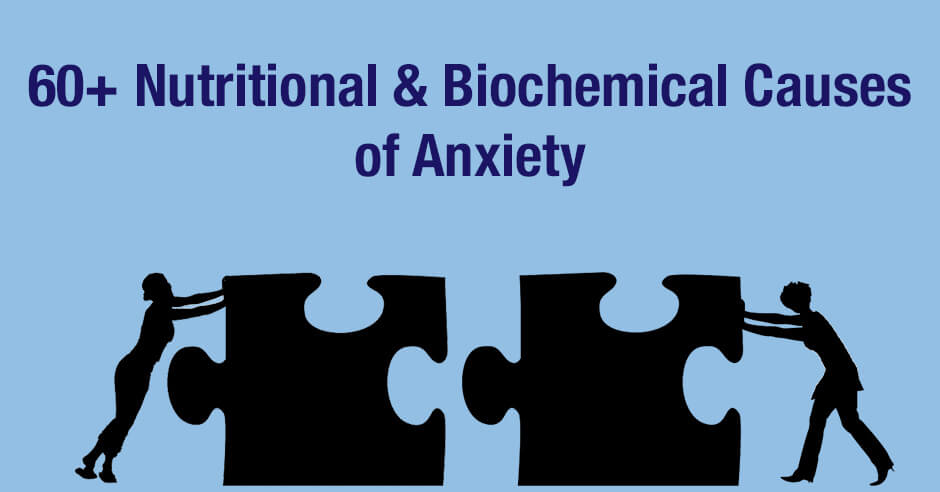
This blog covers the nutritional or functional testing I use with my clients, and what tests I’d run (and/or have my client’s doctor run) if everyone had unlimited funds.
Often it can be challenging to figure out the root cause/s of your anxiety, but that’s where questionnaires, nutritional/ functional/ testing, and a good practitioner (or team of practitioners like nutritionist, functional medicine doctor, nurse practitioner, therapist etc.) comes in – so you can put all the puzzle pieces together.
The following are what I have most of my clients do:
- The basic blood work that I like to see is a lipid panel, a CBC (complete blood count), a metabolic panel, an iron panel that includes ferritin, and a thyroid panel that includes TSH, free T3, free T4, reverse T3, thyroid antibodies (antithyroglobulin and antithyroperoxidase), vitamin D, and CRP (C-Reactive Protein). There is much we can determine by looking at functional values: digestive status, possible gut dysbiosis, adrenal function, malabsorption, inflammation, as well as low iron, low vitamin D etc. I’ll share more about the markers on this panel of tests in a later blog post.
- I also like to see an adrenal saliva test, which measures four times cortisol. So it’d be a saliva collection first thing in the morning, noontime, 5:00 PM, and 10:00 PM. It also shows DHEA; Secretory IgA; and an anti-gliadin antibody (a marker of gluten sensitivity)
- I rely on the Pyroluria Questionnaire and response to the supplements. The pyroluria urine test is a possibility. But I seldom have clients do it, because we can often see a false negative.
- For neurotransmitter imbalances – low serotonin, low GABA, low catecholamines and low endorphins – I rely on the Amino Acid Questionnaire and response to amino acids. Vitamin Diagnostics offer a platelet serotonin/dopamine/norepinephrine and epinephrine panel, which is the most accurate way to measure neurotransmitters, if you really wanted to measure them. I don’t ever recommend urinary neurotransmitter testing. It just doesn’t seem to correlate with symptoms.
- B12 levels. To determine a B12 deficiency, you would want to measure B12, methylmalonic acid (or MMA), and homocysteine.
- The 23andme genetic testing. This will measure MTHFR, COMT, MAOA, CBS, GAD and many more polymorphisms.
Here is other testing that may be helpful for certain individuals:
- A sex hormone saliva test. This will measures progesterone, estriol, estrone, estradiol, and testosterone. I have a wonderful nurse practitioner that I work with, and, if need be, will refer people out to the nurse practitioner if we need support when it comes to bioidentical hormones.
- A food intolerance test that measures IgG antibodies to 60+ foods. This shows a delayed reaction to the foods.
- A fatty acid test. This will measure omega-3s (EPA and DHA), omega-6s and omega-9s. And it’ll also measure trans fats. Doing this test is really helpful if you have pyroluria or think that you may have pyroluria.
- A RBC (red blood cell) magnesium test. Dr. Carolyn Dean talked about the usefulness of this test season 2 of The Anxiety Summit: Take magnesium and melt your anxiety away
- A stool test. Metametrix/Genova and Diagnostechs offers functional stool testing. It’ll show good bacteria, yeast, parasites, bad bacteria, and digestive markers.
- A hydrogen breath test or SIBO test. Genova offers this or you can ask your conventional doctor to order this.
- The H/pylori antigen test. Genova offers this or a conventional doctor can do this.
- Intestinal permeability profile. Genova offers this.
- A celiac panel. Genova offers this, or a conventional doctor can do this.
- The Cyrex panels, which will show gluten and food cross-reactions, and various autoimmune markers.
- The histamine whole blood is a useful test to see if you have high histamine/histadelia or low histamine/histapenia. This is offered by Vitamin Diagnostics and must be WHOLE blood.
- Spectracell shows vitamin and mineral deficiencies.
- A VAP test. If you have concerns about high cholesterol and heart disease, this is going to measure particle size, fibrinogen, Lp(a) and other cardio markers (since looking at only high total cholesterol is not particularly useful).
- The OAT/Organic Acid Test. Great Plains offers this and it has markers of digestion, yeast overgrowth, infections, B vitamin status and neurotransmitter function.
- A hair mineral analysis. This is a great way to look for toxic metals and mineral status. You want to look at ratios, not just levels. This is a good marker for copper toxicity as well. Analytical Research Lab offers this test.
- If you think your copper is too high, or you’ve got low zinc, you can measure copper or ceruloplasmin. This is in serum.
- Porphyrin testing. This is a measure of the effect of heavy metals such as lead and mecury. Kris Homme talked about this in Season 2 of the Anxiety Summit: Your hidden mercury burden – A likely root cause of the other root causes of anxiety – part 2
- An amino acid profile, which is a plasma or blood spot test. It’s not something that I use very often, but I have seen people with this test.
- You can also test candida antibodies in blood, which is not terribly accurate, but sometimes will show up.
I want to look into the following testing:
- The gene testing that Dr. Peter Osborne talks about in his interview on Season 3 of The Anxiety Summit: Grainflammation – How Grain Consumption Contributes to Anxiety and other Mood Disorders
- The mold testing that Dr. Jill Carnahan talks about in her interview, also during Season 3 of The Anxiety Summit: Is Toxic Mold the Hidden Cause of Your Anxiety?
- Testing of oxytocin by Meridian Valley – a 24 hour urinary test. I blogged about oxytocin, social anxiety and autism here
What functional/nutritional testing have you had done and have found to be helpful? Which of the above tests would you like more detailed information about?





